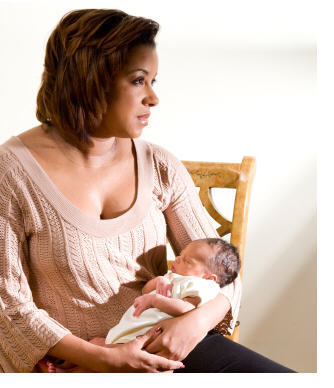
Mothers with Postpartum Depression
Would Welcome Online Professional Treatment
CWRU, April 4, 2013—Mothers suffering from postpartum depression after a high-risk pregnancy would turn to online interventions if available anonymously and from professional healthcare providers, according to researchers from Case Western Reserve University’s Frances Payne Bolton School of Nursing and College of Arts and Sciences.
Postpartum depression, a moderate to severe depression that can occur after a woman has given birth, affects about 7 to 15 percent of new mothers. The effects can be felt soon after delivery to as long as a year later.
The Case Western Reserve study, which recruited survey participants from four popular information sites for new mothers, found that many women don’t seek counseling because of the time constraints of caring for a new-born and the stigma attached to depression.
“Mothers cannot always find a sitter and then spend time driving to and from counseling,” said Judith Maloni, PhD, RN, FAAN, the lead investigator and professor of nursing. “An online intervention is available when the moms have time.”
Co-investigator Amy Przeworski, PhD, assistant professor of psychology in the university’s College of Arts and Sciences, reported that the respondents would welcome a resource that was anonymous and offered professional advice that didn’t require medications.
Researchers from nursing and psychology focused on 53 mothers who fit the study’s criteria: They were hospitalized for complications from their pregnancies and felt depressed the week before the study. Participants represented all geographic regions of the U.S. and were ethically diverse. Their average age was 32, and most where college-educated.
Their findings in the study, “Web recruitment and Internet use and preferences reported by Women with postpartum depression after pregnancy complications,” appear in Archives of Psychiatric Nursing.
The study was the first online effort to seek information from new moms, many who suffered silently with postpartum depression but sought help from online sources, said Maloni, who has previously studied postpartum depression in women with normal or complicated pregnancies that required bed rest and some hospitalization.
Respondents said they would welcome a professional resource they could access at any time. They also preferred learning strategies to cope, information about depression and chat rooms or blogging with a health professional.
Although the exact causes of postpartum depression aren’t known, Maloni has studied the impact of bed rest on pregnant women and found that those with complications before and during the birth of their babies are at greater risk of slipping into depression after delivery.
As a next step, Maloni said, they are designing a Web site and online interventions to address the need.
April 4, 2013
Also contributing to the study was Elizabeth Damato, PhD, RN, CPNP-PC from the nursing school.
